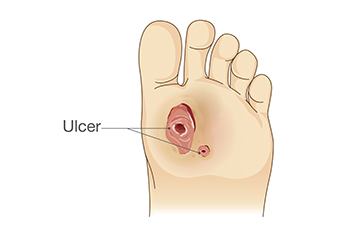3885 S. Decatur Blvd Suite #1080
Las Vegas, NV 89103

Rubbing points, also termed pressure sores, on the feet, toes, or ankles can progress into serious foot ulcers if left untreated. These pressure sores develop when prolonged pressure reduces blood flow, damaging the skin and underlying tissues. People with health conditions that impair circulation, such as diabetes or vascular disease, face a higher risk. Pressure sores are classified by severity, starting as red, painful skin and potentially worsening into deep wounds that expose muscle or bone. Common rubbing sites include the heels and bony areas of the foot. Without proper care, these wounds may become infected, further complicating healing. A podiatrist can assess the severity of a pressure sore and recommend appropriate treatment to prevent complications. This may involve wound care, pressure relief strategies, specialized dressings, or in severe cases, surgery to remove damaged tissue. Regular monitoring and professional treatment are essential to reduce the risk of infection and promote healing. If you have foot sores that are not healing properly, it is suggested that you schedule an appointment with a podiatrist for wound care treatment.
Wound care is an important part in dealing with diabetes. If you have diabetes and a foot wound or would like more information about wound care for diabetics, consult with Loren Hansen, DPM from Ankle & Foot Medical Center. Our doctor will assess your condition and provide you with quality foot and ankle treatment.
What Is Wound Care?
Wound care is the practice of taking proper care of a wound. This can range from the smallest to the largest of wounds. While everyone can benefit from proper wound care, it is much more important for diabetics. Diabetics often suffer from poor blood circulation which causes wounds to heal much slower than they would in a non-diabetic.
What Is the Importance of Wound Care?
While it may not seem apparent with small ulcers on the foot, for diabetics, any size ulcer can become infected. Diabetics often also suffer from neuropathy, or nerve loss. This means they might not even feel when they have an ulcer on their foot. If the wound becomes severely infected, amputation may be necessary. Therefore, it is of the upmost importance to properly care for any and all foot wounds.
How to Care for Wounds
The best way to care for foot wounds is to prevent them. For diabetics, this means daily inspections of the feet for any signs of abnormalities or ulcers. It is also recommended to see a podiatrist several times a year for a foot inspection. If you do have an ulcer, run the wound under water to clear dirt from the wound; then apply antibiotic ointment to the wound and cover with a bandage. Bandages should be changed daily and keeping pressure off the wound is smart. It is advised to see a podiatrist, who can keep an eye on it.
If you have any questions, please feel free to contact our office located in Las Vegas, NV . We offer the newest diagnostic and treatment technologies for all your foot care needs.